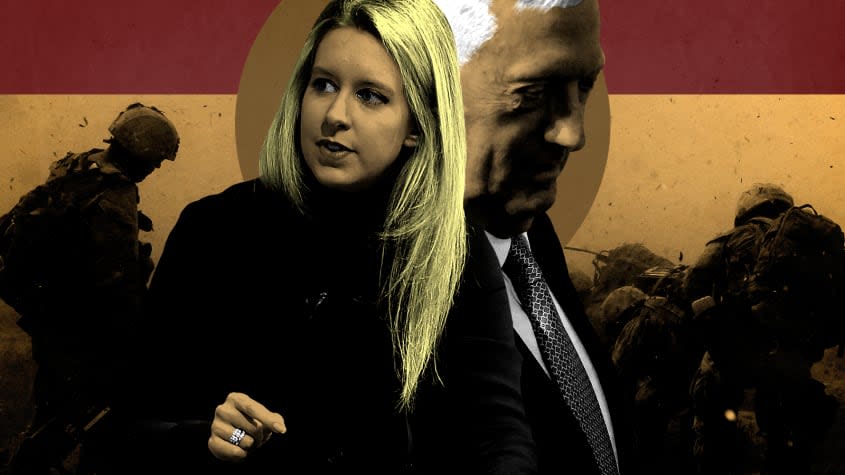Did Theranos Lose Afghanistan?

- Oops!Something went wrong.Please try again later.
Another great American screwup is reaching its conclusion. This week, the trial of Theranos founder Elizabeth Holmes began in federal court. Once celebrated as the face of the tech future, Holmes is accused of defrauding investors. If convicted, she and her boyfriend and business partner Ramesh Balwani face prison sentences up to 20 years.
The San Jose courtroom where Holmes is being tried is a long way from Kabul, where U.S. citizens are still being evacuated following the withdrawal of American forces last month.
But there's a tighter link than meets the eye. Like the Afghanistan debacle, Theranos is a horror story of wishful thinking, credulous media, and celebrity impunity. Whether or not intentional deception was involved, both episodes display the dishonesty and incompetence of interlocking tech, finance, media, and military elites.
The connection is personal. Among the expected witnesses in the trial is former Marine Gen. Jim Mattis, who fought in Afghanistan as a brigadier general, later oversaw the war as head of Central Command, and finally served as former President Donald Trump's secretary of defense. Mattis became involved with Theranos while still in uniform. After retiring from the armed forces, Mattis joined Henry Kissinger, George P. Shultz, and other national security eminences on Theranos' board, lending the company a gravitas that few startups enjoy.
Mattis denies any wrongdoing, claiming he was taken in, too. Even if that's true, his role is discreditable. Mattis' association with the company began in 2011, when he met Holmes at a Marine Memorial event in San Francisco. According to author John Carreyrou and other journalists, he immediately began campaigning for military adoption of Theranos' ostensibly innovative bloodtesting technology. Mattis was not deterred by the lack of FDA approval and mounting doubts about whether the technology actually worked. After his retirement in 2013, Mattis also ignored legal advice that it would be improper to join the board while the company was seeking procurement of its products for use in Afghanistan.
There's no reason to think Mattis' hopes for Theranos interfered with his main duties. Looking backward, though, it's hard to miss the similarities between his dalliance with Theranos and broader tendencies revealed by the so-called Afghanistan Papers.
One parallel is the phenomenon Matt Stoller diagnosed as "the pervasiveness of over-optimism" (the phrase is borrowed from an Inspector General report issued in July). Like the tech industry, the senior ranks of the officer corps are dominated by wishful thinking.
This habit has roots in the reasonable idea that you're unlikely to achieve anything if you expect to fail. In practice, though, it means risks, doubts, and problems get dismissed as psychological defects rather than real problems. The milder version of this tendency is a vaguely New Age commitment to maintaining a positive attitude in the face of setbacks. The more severe form, evident both in Afghanistan and at Theranos, is a habit of lying in the hope that the lies will one day become true.
Faith in heroic individuals is another point of resemblance. Theranos' initial success rested on the charisma of Holmes, whose severe good looks and oddly deep voice captivated the media and investors. Rather than being recognized as a young businesswoman with a product to sell, she was hailed as a combination of executive and prophet. Inside and outside the company, doubts about Theranos were treated as rejections of her visionary qualities.
The Afghanistan War included its own succession of would-be saviors. Gens. David Petraeus, Stanley McChrystal, and Mattis himself were each celebrated as scholar-soldiers whose extraordinary virtues would redeem evidently floundering efforts. Knowing what we do now, it's embarrassing to recall the adulation they enjoyed in their respective heydays.
Beyond the fawning coverage they received from the media, each of these hero generals developed a cadre of personal acolytes whose loyalty struck outsiders as cult-like.
Part of Mattis' attraction to Holmes may have rested on the similarity between her style and personality-driven military leadership. That affinity encouraged and then concealed failure in both cases.
Finally, the overlap between Theranos and Afghanistan demonstrates both the interlocking character of the American ruling class and the impunity that its members enjoy until their conduct becomes literally criminal. The same people who make decisions in Washington end up sitting on the same boards in Silicon Valley and appearing on the same New York-based cable channels. In the grand scheme of things, it's not such a big deal that Mattis suffered few consequences for his involvement with Theranos. It's hugely important, though, that he and other celebrity officers were not only promoted for their roles in losing a two-decade war, but that they continue to be celebrated and richly compensated as authors, management consultants, and national security wisemen.
In his farewell speech as president, Dwight Eisenhower worried about the influence of the "military-industrial complex." The entanglement continues, as retired officers continue to take lucrative positions with defence contractors. Over the last 70 years, though, "the blob" has extended its tentacles into finance, the media, academia, and beyond. The alleged fraud committed by Elizabeth Holmes isn't the reason we lost in Afghanistan. But the reasons she was so successful for so long help explain our defeat there, too.
You may also like
Biden's new vaccine rules have a familiar problem
Biden enters a politically perilous phase
My Big Fat Greek Wedding star Michael Constantine dies at 94

